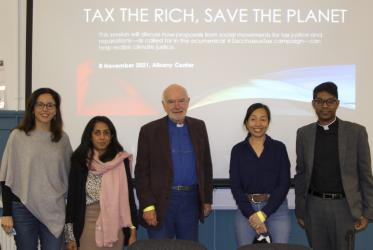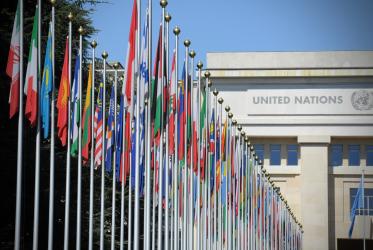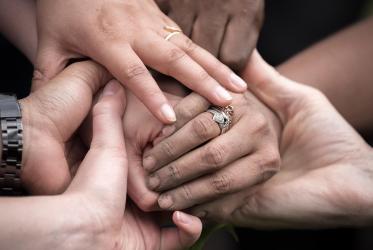These days everyone uses the words “change” or “transformation” yet they are used to describe very different things. The French president Emmanuel Macron speaks of the transformation of the French economy through the liberalisation of labour laws, and in his book “India Transformed” Rakesh Mohan describes the benefits achieved by 25 years of neo-liberalism. So what do church-related aid organisations like Action de Carême, Bread for All and Être partenaires mean when they use the word “transition”? Is this concept really part of the Christian message?
Looking at the fight against disease, the reduction of absolute poverty and the global increase in schooling, the US lawyer Gus Speth comes to the conclusion: “We’ve won many battles, but we are losing the planet.” Moreover, according to the NGO platform Smart CSOs, we are facing a systemic crisis of multiple dimensions.
Climate change, floods, droughts, the loss of biodiversity are symptoms of an ecological crisis, whereas the widening inequality gap reflects a social and economic crisis. According to a study by Oxfam the combined wealth of the world’s richest 1 percent has overtaken the wealth of the remaining 99 percent. Professional burn-out, stress and overwork are also signs of a spiritual crisis; no one can ignore the psychological problems that characterise our time. Finally, demonstrations, the disaffection of electorates and growing nationalism are signs of a democratic crisis.
If this is a rather summary analysis, the problems which it reveals nevertheless bear witness to a systemic crisis requiring a transformation.
Many alarms are already sounding
Karl Polanyi was the first to use the concept of “great transformation” or “great transition”, in his book of the same title published in 1940. In it he uses the term to describe the upheaval in western societies between the end of the 19th and beginning of the 20th centuries as a result of the industrial revolution. Around sixty years later, the US-Swedish institute Global Scenario Group used the term “Great transition” to sketch out a vision of a society of peace and solidarity.
The Transition Towns movement – a network with the goal of achieving self-sufficiency – began to emerge from about 2006 onwards Just a few years later the general assembly of the United Nations had as its theme ”Transform our world” and on 25 September 2015 adopted its “Agenda 2030” with its focus on the Sustainable Development Goals (SDGs). It seems clear that between its invention by Polanyi and the putting in place of the SDGs the notion of transition has evolved and continues to evolve today.
This change was due, to the churches among others, repeatedly sounding the alarm during this period: for instance the Conciliar Process for Justice, Peace and the Integrity of Creation 1983- 1989, the World Council of Churches’ statement on climate change (Busan 2013) and in particular, Pope Francis’ encyclical (2015). Even before the UN’s declaration of the Sustainable Development Goals, the Pope in his encyclical “Laudato si” demonstrated that ecology and the struggle against poverty go hand in hand. This brief overview would argue in favour of a link between the Christian message and the great transition.
What do we need to change?
The great transition concentrates on improving civil society strategies for resolving global crises linked, for example, to climate change or famine. Rather than tackling the symptoms, our visions need to address root causes and seek to go towards the concept of “buen vivir” a good life for all.
Smart CSOs drew up a model which outlines three levels: a) the level of cultures and values; b) the level of political, economic and social institutions; and c) the level of local needs. This analysis shows that change is already underway and does not need to start from zero.
At the second level, the economic model looks towards means of production which are less intensive in their use of both energy and natural resources. It is nevertheless important to remain vigilant so that efforts to increase energy efficiency are not wiped out by calls for increased consumption and travel. The great transition also requires a change in our current discourse. Whereas rich countries still seek to promote their own interests by playing the card of consumption and growth, the great transition points in the direction of a world of solidarity based on sobriety and equality. By trying to live out and promote these values, NGOs and the churches are already taking part in this change.
The role played by the great transition within the work of Action de Carême
The need for transition is felt alike in rich countries and in economically disadvantaged countries. Two months ago I discovered for myself the Action de Carême programme in India which helps around 120,000 Adivasi and Dalit people. I visited the Assam region in the north east of the country where rice and cereal banks mean that the Adavasi people there have access to food all year round. Thus if there is a poor harvest, this indigenous minority no longer has to go into debt by borrowing at exorbitant rates, because the members of the rice and cereal banks build up reserves which then allow them to share in case of need. Such banks are “niche” enterprises at the local level and represent the seeds of the new economy. Strategies of advocacy and lobbying seek to help the Adivasis to assert their existing rights with the current “regimes” (village councils), so that they can have access to land, drinking water and schooling. Over recent years, some Adavasis have even become members of their village councils, going from being a marginalised minority to participating in public life.
The Indian government applies a development model that is based solely on growth in GNP while at the same time only promoting one single culture, as if everyone were Hindu. However, Action de Carême helps the Adivasis to defend their culture and traditional religion and even helps them organise cultural festivals so that their authentic ethnic voice can be heard. These different actions demonstrate that the great transition has to have its foundations in a multitude of small advances.




